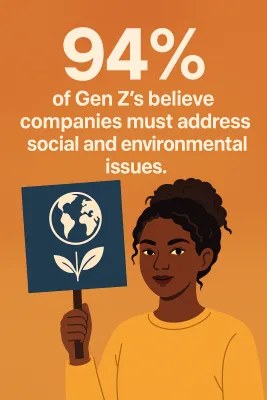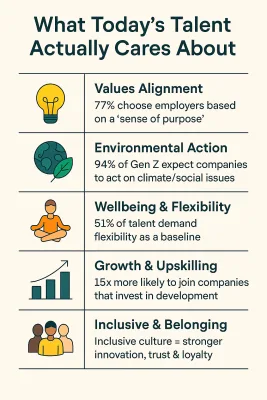Welcome to 2025 — where talent doesn’t just choose jobs. It chooses belief systems.
That graduate you’re courting isn’t just evaluating your salary package. They’re asking: “Is this the kind of company I want to become a part of? Will working here make me complicit in something I believe in — or something I’m ashamed of?”
The seasoned executive considering your C-suite role isn’t just looking at equity. They’re wondering: “Can I tell my children I’m proud of where I spend 50+ hours a week? Does this company’s footprint on the world align with the legacy I want to leave?”
This isn’t about being “woke” or following trends. This is about survival.
The workforce has fundamentally shifted. Top talent now treats job interviews like moral audits. They’re not just asking “What do you do?” They’re demanding “What do you stand for? And can you prove it?”
The power dynamic has flipped. Companies are no longer the ones doing the choosing. Talent is.
The Non-Negotiable Revolution: What Today’s Talent Demands
1. Values Alignment: Your Company’s Soul on Trial
The statistics are stark: 83% of employees would consider leaving jobs if CSR practices aren’t upheld. But here’s what’s really happening beneath those numbers — talent is treating corporate responsibility like a deal-breaker, not a nice-to-have.
77% cite a “sense of purpose” as critical in employer choice. This isn’t about ping-pong tables or free snacks. This is about whether your company contributes to the world they want their children to inherit.
 Gen Z isn’t playing games here: 94% believe companies must address social and environmental issues. They’re not asking politely — they’re demanding it. And if you don’t deliver? They’ll find someone who will.
Gen Z isn’t playing games here: 94% believe companies must address social and environmental issues. They’re not asking politely — they’re demanding it. And if you don’t deliver? They’ll find someone who will.
The days of corporate virtue signaling are over. Today’s talent has developed a radar for authenticity. They can smell performative purpose from across the interview table. They want to see evidence, not promises. Action, not mission statements.
2. Environmental Responsibility: The Planet as Your Performance Review
90% of consumers would switch to sustainable brands — and employees mirror this expectation. The days of greenwashing are over. New EU regulations (CSRD/CS3D) mean transparency isn’t optional anymore; it’s legally mandated.
Top talent knows that working for an environmentally irresponsible company makes them part of the problem. They’re choosing employers who demonstrate genuine environmental commitment through actions, not just marketing copy.
Climate change isn’t a distant threat to this workforce — it’s their lived reality. They’re making career decisions based on which companies are part of the solution versus which ones are perpetuating the problem. Your environmental practices aren’t just corporate policy; they’re a reflection of your company’s moral character.
3. Wellbeing & Flexibility: From Perk to Prerequisite
The shift is complete: 51% of candidates rank flexibility as a top expectation — not a negotiable benefit, but a fundamental requirement. Companies that don’t offer genuine flexibility aren’t even making it to the final rounds of consideration.
But here’s where it gets deeper: this isn’t just about remote work options. It’s about respect for human autonomy. It’s about acknowledging that your employees are whole people with lives, families, interests, and responsibilities beyond your company walls.
CSR initiatives correlate with 23% higher job satisfaction and reduced burnout. The message is clear: companies that care about their broader impact also tend to care better for their people. Talent recognises this connection and uses it as a proxy for how they’ll be treated.
The workforce has learned that mental health isn’t just personal wellness — it’s resistance against systems that prioritise productivity over humanity. They’re choosing employers who see them as humans first, workers second.
Explore wellbeing strategies in “Work-Life Balance in the Digital Age” and learn about combating workplace isolation.
4. Growth & Leadership: Investing in Human Potential
Employees are 15x more likely to join companies with robust upskilling programs. But this statistic misses the real story: talent is choosing companies that believe in their potential, not just their current utility.
Here’s the crisis: 70% of companies fail to develop middle managers effectively. The talent you’re trying to attract knows this. They’re not just evaluating their immediate role — they’re assessing whether your company is the kind of place where they can become who they want to become.
49% of executives worry employees lack skills for business strategy execution. Smart talent sees this as an opportunity. They’re gravitating toward companies that are serious about bridging this gap, because they know that’s where the growth happens.
The most ambitious professionals aren’t just looking for jobs — they’re looking for transformation. They want to work for companies that will make them better, smarter, more capable than they were when they walked in the door.
5. Inclusive Culture: Belonging as a Business Imperative
Despite legal challenges to some DEIB initiatives, purpose-driven inclusion remains vital. But here’s what’s really happening: talent is evaluating companies based on how they treat the most vulnerable people in their orbit.
Employee Resource Groups and genuine accountability aren’t just nice to have — they’re business-critical signals about company character. Top talent knows that companies that create psychological safety for everyone create better conditions for everyone.
The workforce understands something that many leaders are still learning: innovation requires diverse perspectives, and diverse perspectives require inclusive environments. They’re choosing companies that don’t just tolerate difference — they actively cultivate it.
Your Workspace: The Truth Test
Here’s what most companies don’t understand: your workspace is where your values stop being theoretical and become tangible.
When potential talent walks through your office, they’re conducting a values audit:
- Does this space reflect genuine care for employee wellbeing, or just aesthetic trends?
- Do these facilities demonstrate environmental consciousness, or just cost-cutting?
- Is this environment designed for human flourishing, or just maximum efficiency?
- Does this space feel inclusive and welcoming, or exclusive and intimidating?
Your office reveals what you actually prioritise when you think no one is watching. It’s where your budget meets your beliefs. It’s where talent discovers whether your company culture is authentic or performed.
The workspace has become a litmus test for company integrity. Beautiful marketing materials can lie. Your office space cannot.
At Workways, we understand that your office choice is a strategic decision about talent attraction and retention. Our spaces are intentionally designed to reflect the values that today’s top talent demands:
- Environmental responsibility through carbon-neutral operations and sustainable design
- Flexibility and wellbeing through adaptable spaces that support both focus and collaboration
- Professional excellence through thoughtfully designed environments that inspire great work
- Community and inclusion through spaces that bring diverse teams together
- Growth orientation through facilities that support learning, development, and innovation
The Choice Economy: Where Talent Holds the Cards
We’re living in the first truly choice-driven job market in modern history. Top talent has options, and they know it. They’re not just comparing salaries or benefits packages — they’re comparing worldviews.
They’re asking themselves:
- Which company’s success am I willing to be responsible for?
- Which organisation’s impact on the world can I defend to my friends and family?
- Which employer’s values align closely enough with mine that I can show up as my authentic self?
This is the talent ultimatum: Meet our non-negotiable expectations around values, environment, wellbeing, growth, and inclusion — or watch us choose your competitors who will.
See how workspace design reflects company values and explore the workplace trends reshaping 2025.
 The Ultimatum: Evolve or Become Irrelevant
The Ultimatum: Evolve or Become Irrelevant
The workforce has issued its ultimatum, and it’s non-negotiable. Companies that treat these expectations as optional requests will find themselves competing for increasingly mediocre talent while watching their best people gravitate toward organisations that understand the new rules.
This isn’t a temporary cultural moment or generational phase. This is a fundamental shift in the relationship between employers and employees. Power has moved from those who control jobs to those who create value.
The Cost of Ignoring the Future
- Continue operating under the assumption that people need you more than you need them
- Or recognise that in the choice economy, your values are your competitive advantage
Your workspace decision is often the first tangible evidence of which choice you’ve made. It’s your opportunity to prove that you understand the gravity of this moment and the expectations of the workforce that will define the next decade.
The question isn’t whether you can afford to meet these expectations. The question is whether you can afford to ignore them.
“If your dream candidate walked through your workspace today… what would they see? A company aligned with the future — or one clinging to the past?”
For strategic insights on aligning your workplace with modern talent expectations, explore Real Estate Outsourcing Trends: Maximizing Efficiency for Forward-Thinking Executives. The future of work demands spaces that reflect the values of the people who create value.
Like this perspective? We share workplace culture insights like this every week — no spam, just strategy.”
👉 [Sign up for insights by join our weekly newsletter→]



 Fr
Fr